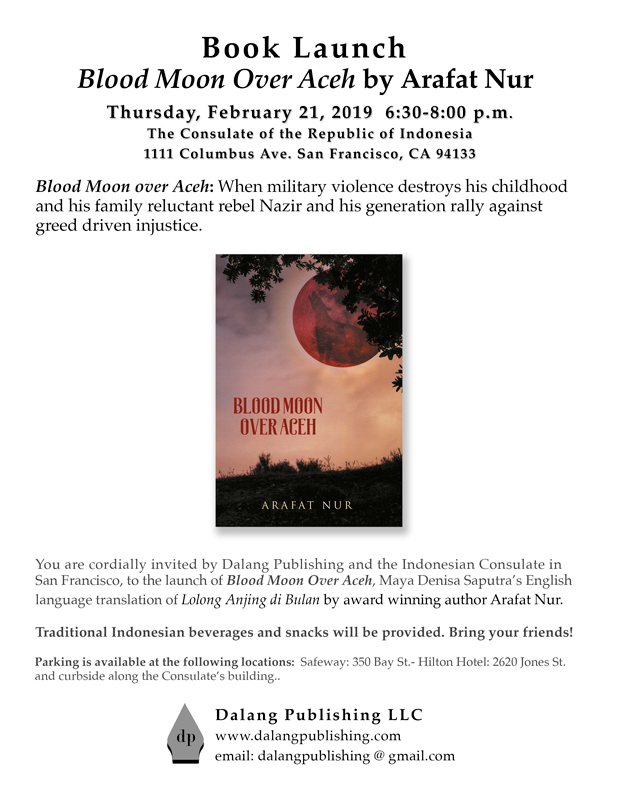Our 2018 Trip Home
In November 2018, Dalang went home for the launch of Lolong Anjing di Bulan by Arafat Nur. This publication is a collaborative effort between Dalang Publishing and Sanata Dharma University Press in Yogyakarta. Blood Moon over Aceh, the English translation by Maya Denisa Saputra, publishes in January 2019.
We visited the novel’s setting in Aceh and promoted the work through seminars, lectures, and book discussions, in cities on Java and Sumatra.
Jakarta, November 5, 2018
In Jakarta at midday on Monday, November 5, 2018. Pak Nono, Ibu Lian’s nephew, his wife, Oeke, and Riri Satria, met at the Soekarno Hatta International Airport. They kept us company while waiting for our flight to Semarang later that afternoon. Thank you Riri, Pak Nono, and Mbak Oeke.
Semarang, November 7, 2018
National Seminar: Introducing the Indonesian Language and Literature to the World.
Hosted by: The Faculty of Language Education and Art of Universitas PGRI Semarang.
Dalang are grateful for the assistance of Dr. Prasetyo Utomo, a writer and lecturer at this university, for initiating Dalang’s participation in this event.
Pak Arisul met Ibu Lian at the Semarang Airport and drove to Roemah Keboen, well-known for its authentic Semarang cuisine, where Ibu Maria Yosephin Widarti, chair of the seminar, was already waiting for us.
This national seminar was held in context of celebrating our language. In her keynote Merayakan Bulan Bahasa dengan Mengulang Soempah Pemoeda, — Celebrating Language Month with Renewing the Youth Pledge — Second Youth Congress on October 28, 1928, Ibu Lian stressed the importance of protecting the sanctity of the Indonesian language from undue infiltration by the English language, due to the current climate of living in globalization and a focus on economic growth.
We introduced Lolong Anjing di Bulan and its English translation Blood Moon over Aceh.
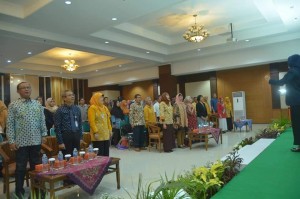
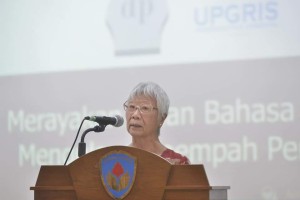
Yogyakarta, November 9, 2018
The Launch of Lolong Anjing di Bulan by Arafat Nur was a part of the 2018 Dies Natalis program of Universitas Sanata Dharma.
It was an honor to have the opening remarks presented by the Rector of the Sanata Dharma University, Drs. Johanes Eka Priyatma, M.Sc., Ph.D.
We extend our gratitude to Vice Chancellor IV, F.X. Ouda Teda Ena, M.Pd., Ed.D. and his office staff, especially Elin, for their great help during the entire process of this publication.
Lolong Anjing di Bulan /Blood Moon over Aceh was introduced by a panel consisting of Arafat Nur, the author, Dr. Junaedi Setiyono, M.Pd. the editor, Maya Denisa Saputra, the translator, and Poet /Activist Zubaidah Djohar, one of the back cover reviewers. Dra. Novita Dewi, M.S., M.A.(Hons), Ph.D. represented the University of Sanata Dharma Press with an in-depth review. Lian Gouw represented Dalang Publishing and acted as panel moderator.
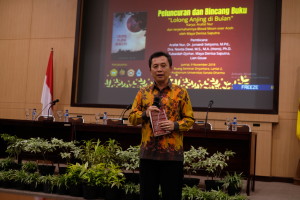
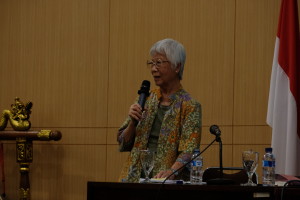
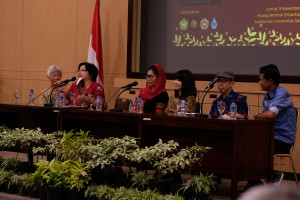
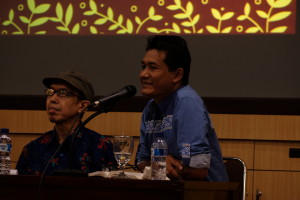
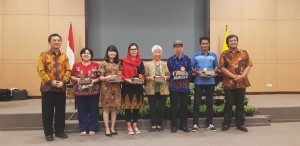
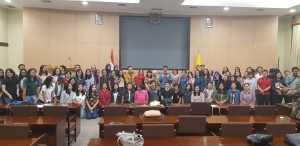
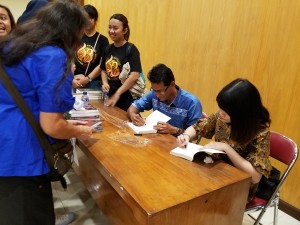
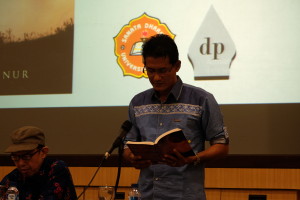
Sumatra, November 10 – 18, 2018.
We are grateful for the company of Zubaidah Djohar during our visit to Sumatra. Aside from having lived in Aceh for many years, Zubaidah has also done intensive research at, among others, the Aceh Institute on the Aceh Conflict. She provided us with an excellent guide for our visit to Alue Rambe, near Lhokseumawe.
Aceh, November 10 – 15, 2018
Banda Aceh
Dalang met Dr.Ir. M. Dirhamsyah, MT a lecturer at the University of Syiah Kuala and a former dean at Universitas Islam Negeri Ar-Raniry. Pak Dirham connected Dalang to Ar-Raniry and provided with a competent driver/guide during our stay at Banda Aceh. Ibu Lian spent a wonderful evening filled with friendship and graced with a delicious dinner with him and his lovely wife, Dian.
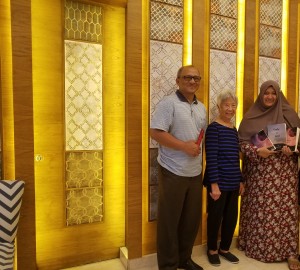
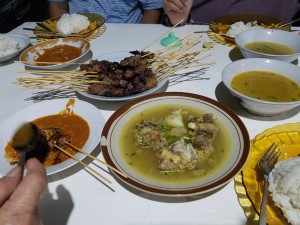
We appreciate the time Prof. Eka Srimulyani, one of the back cover reviewers of Lolong Anjing di Bulan as well as Blood Moon over Aceh, took out of her busy schedule to meet with us over a delicious lunch.
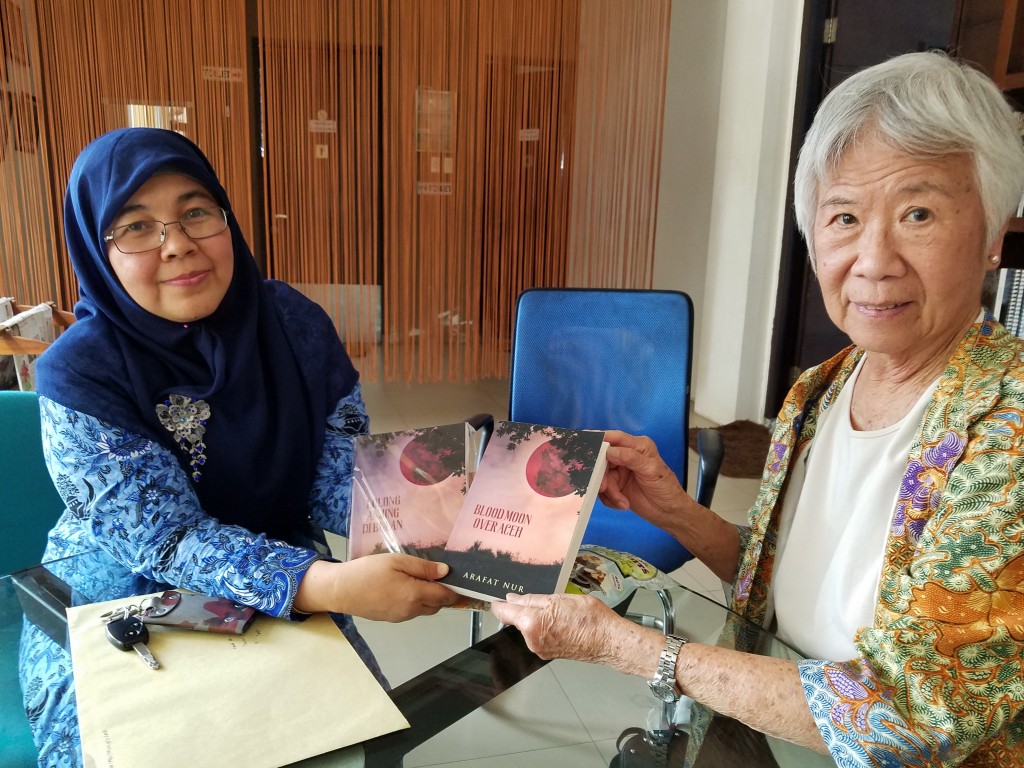
On Sunday, November 11, 2018, Pak Rizwan, our driver /guide, expertly showed us around Banda Aceh. We started the day with a visit to beautiful Lampuuk beach under clear blue skies. Next on our sightseeing list were the historic house of the Acehnese heroine Cut Nyak Dhien, the Aceh tsunami museum, and the grand mosque Baiturrahman.
While a monsoon rain poured out of a sudden dark sky, Pak Rizwan made sure we had a chance to savor delicious Aceh food for lunch. By the time we reached the mosque, the downpour had turned into a very light drizzle but had left the entrance and mosque plaza pretty puddled. After making sure we had covered ourselves appropriately and taken off our shoes, Pak Rizwan escorted us onto the mosque property.
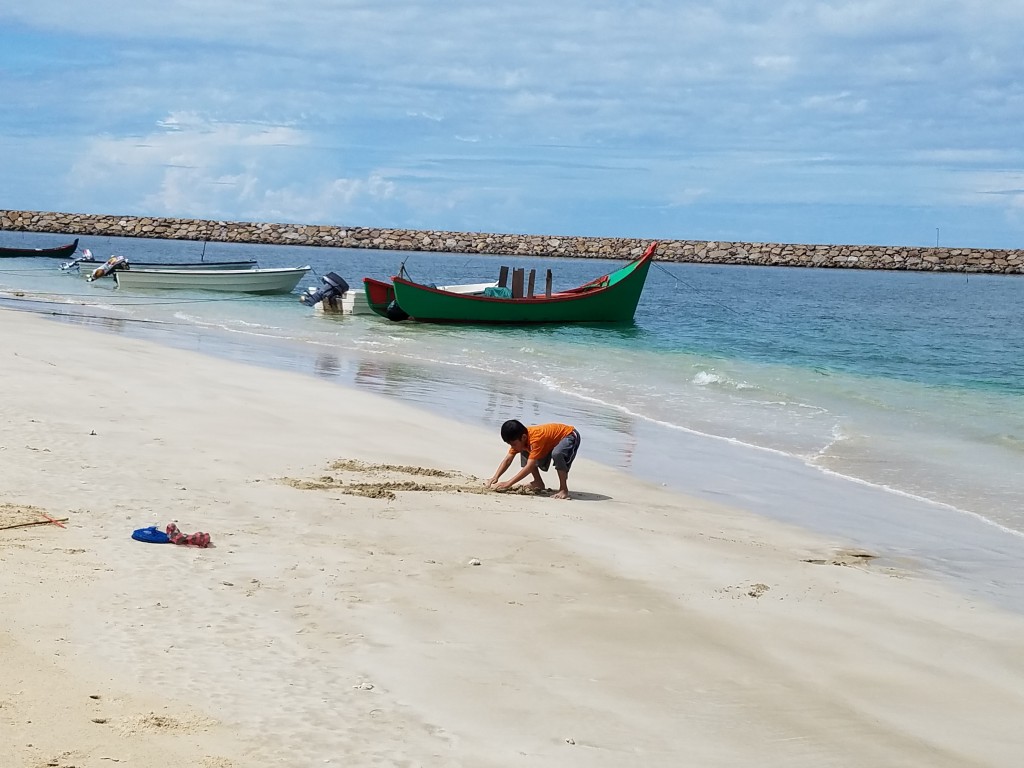
Lampuuk beach
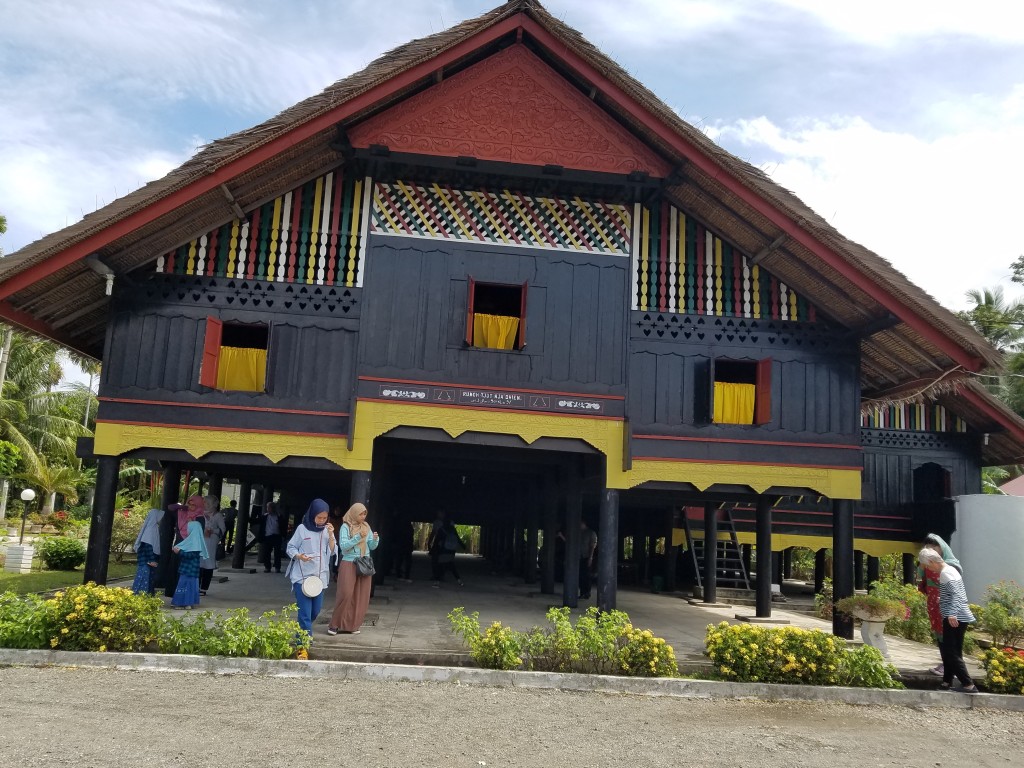
Acehnese heroine, Cut Nyak Dhien’s historical house
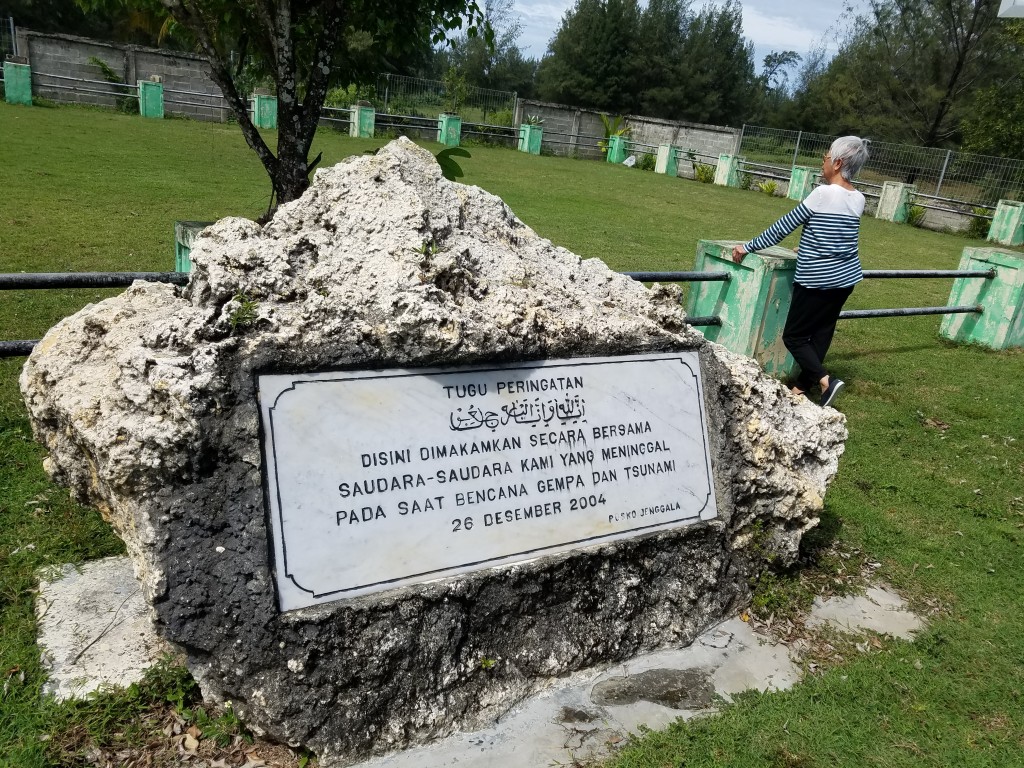
The mass grave site for the victims of the 2004 mega tsunami
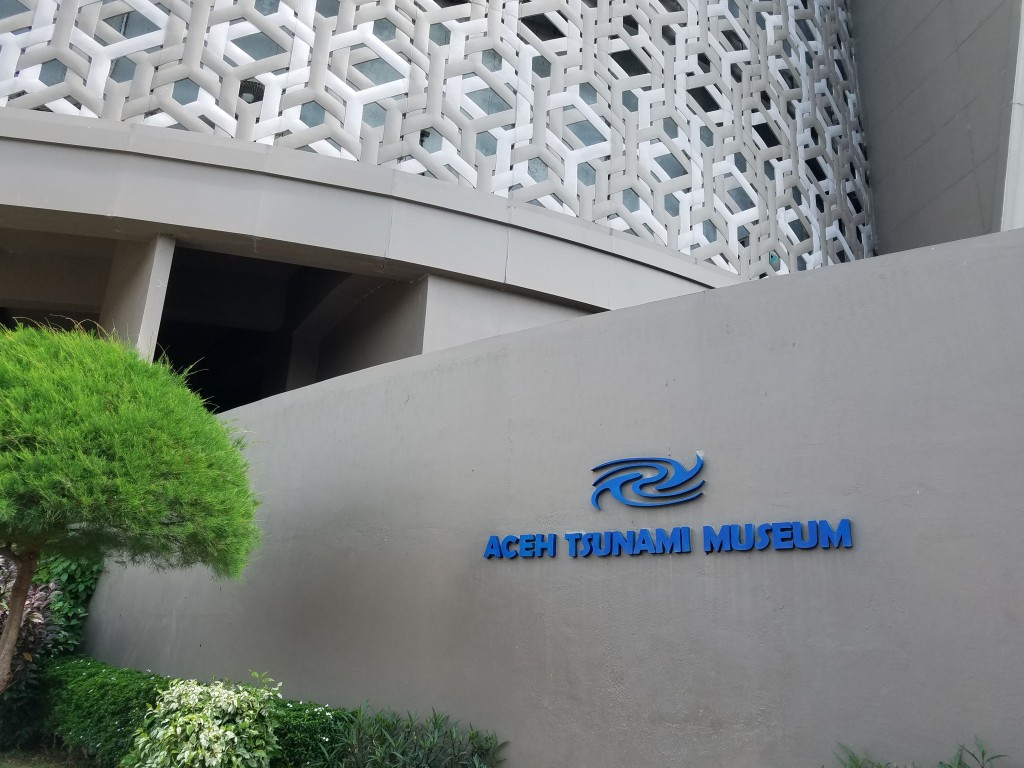
Aceh Tsunami Museum
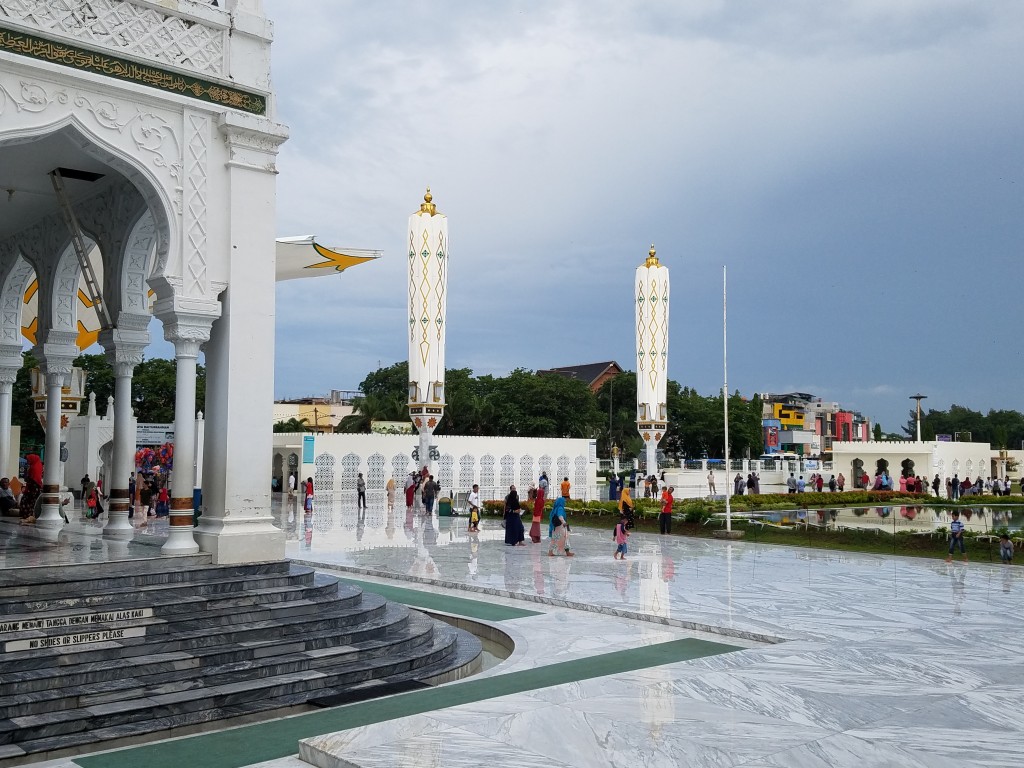
The Grand Mosque Baiturrahman
Banda Aceh, November 12, 2018
Open Lecture on writing.
Hosted by: the Faculty of Dakwah at the University of Ar-Raniry
We are grateful for Pak Dirham’s introduction to Dr. Hendra Syahputra, Head of the Department of Communication and Islamic Studies, Faculty of Dakwah, at the University of Ar-Raniry.
Pak Hendra invited Ibu Lian to give an open lecture on writing, which was well received by the attending class and faculty. It was deeply heartwarming when, at the end of the event, Roni, one of the students, presented Ibu Lian with a sketch of her reading from Only A Girl, her own novel.
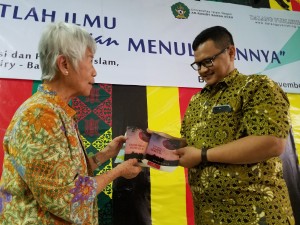
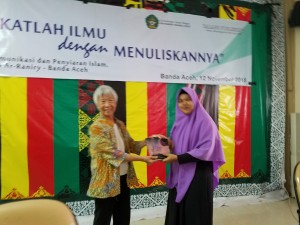
Banda Aceh, November 13, 2018
Seminar on Publishing and Book Discussion of Lolong Anjing di Bulan by Arafat Nur.
Hosted by the University of Syiah Kuala.
Zubaidah Djohar and Acehnese award-winning author Azhari Ayyub, (Kura-Kura Berjanggut, Penerbit Banana, 2018) joined us at this event, organized by Herman Rusli Nuriam, a published author of short stories and lecturer of Indonesian literature, at the University of Syiah Kuala.
The students’ enthusiasm about writing and their interest in literature was encouraging.
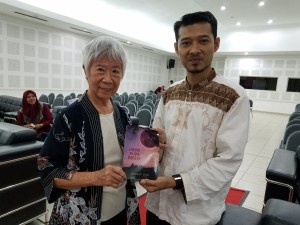
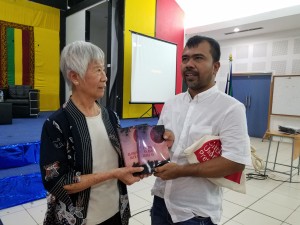
Alue Rambe, November 14, 2018
This was a long awaited, very special day for us. Activist Zulfikar Muhammad, our competent and well connected guide had arranged a meeting with the Village Head and Elders of Alue Rambe as well as Bapak Abdussalam, one of the many villagers who have supported and inspired Arafat Nur during the writing of Lolong Anjing di Bulan.
Having a conversation with people who still have a direct connection with Nur’s vivid account of history but have risen above history’s monstrosities was an unnerving experience. As was standing on the same soil the characters of Nur’s novel endured and walking across the same paths they fled to safety.
As publishers, we are grateful for Nur’s courage to write the story and humbled by his trust in us to bring it properly to the page. We feel a deep responsibility to help spread his warning against greed and acknowledgement that only love and justice will bring much needed peace.
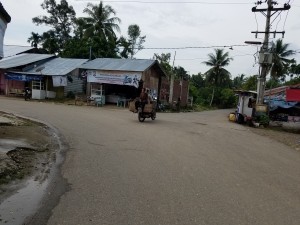
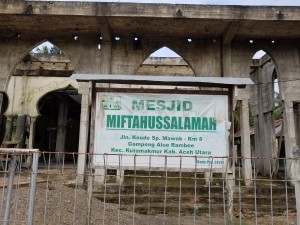
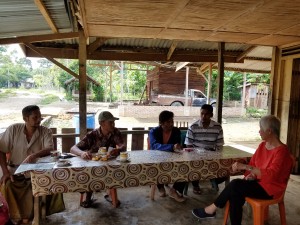
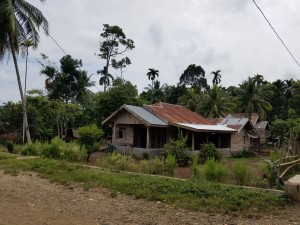
West Sumatra, November 15 -18, 2018
During our stay here we visited several historical places:
Amai Setia in Koto Gadang, the first school for girls founded by Rohana Kudus, the first woman journalist in Indonesia. It was fun to imagine Belenggu Emas /The Golden Shackle, Iksaka Banu’s short story on the Your Stories page of our website, while sitting on a bench in the now curio shop but once must have been the living room where two Dutch socialites waited for Rohana Kudus to come home.
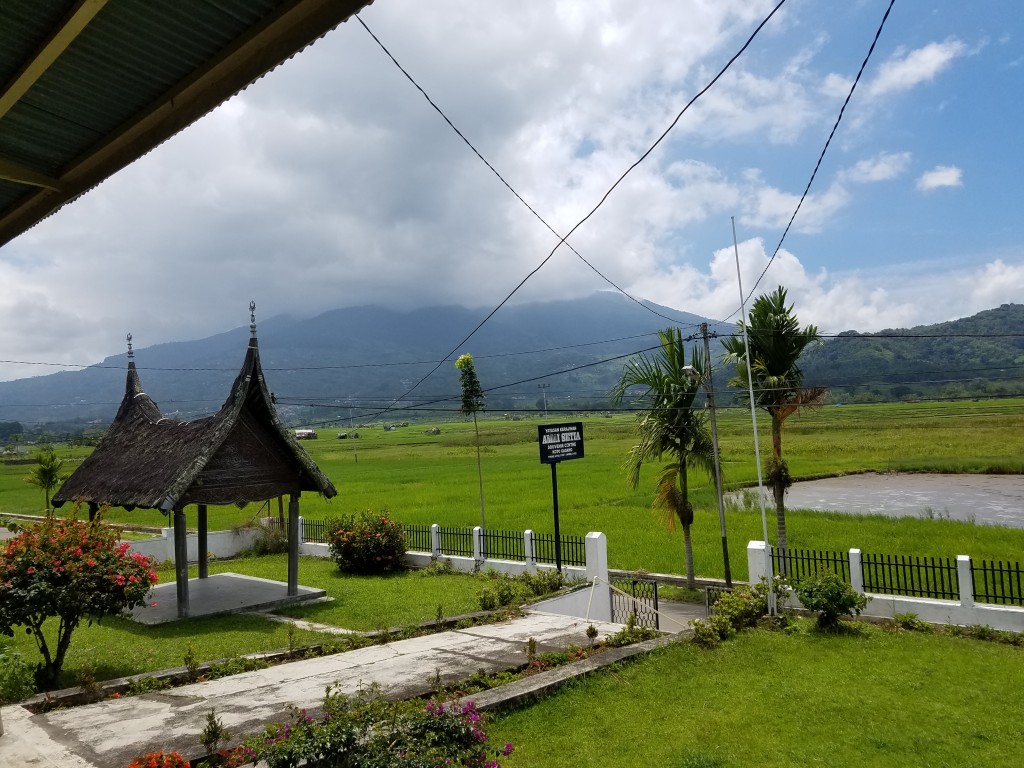
Rumah Puisi Taufik Ismail, Taufik Ismail’s House of Poetry, in Aie Angek, Padang Panjang.
A winding, narrow, country road led us through thin fog to a wonderful little library of the poet’s work. The adjacent cottages are an ideal writer’s retreat.
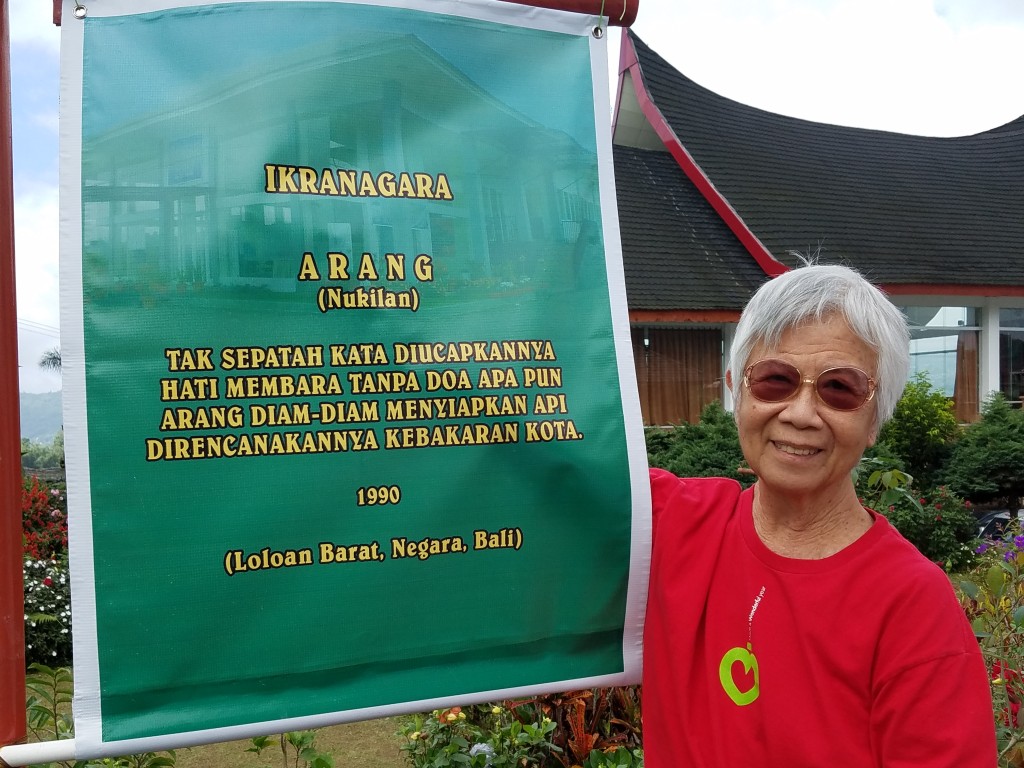
Fort de Kock in Bukittinggi, an old colonial fortress above Bukitttinggi in its current setting was a disappointment. Other than a few canons, very little reminded the visitor of the fort’s history.
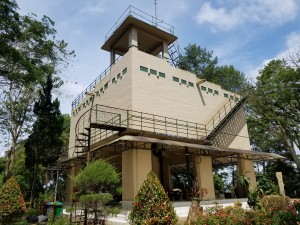
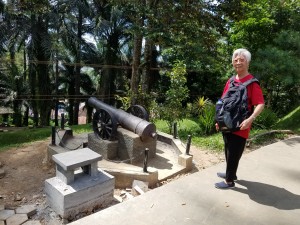
Lake Singkarak, made us think of Love, Death, and Revolution, Stefani Irawan’s English language translation of Maut dan Cinta by Mochtar Lubis. (Dalang Publishing 2015) The lake was an important location in the novel.
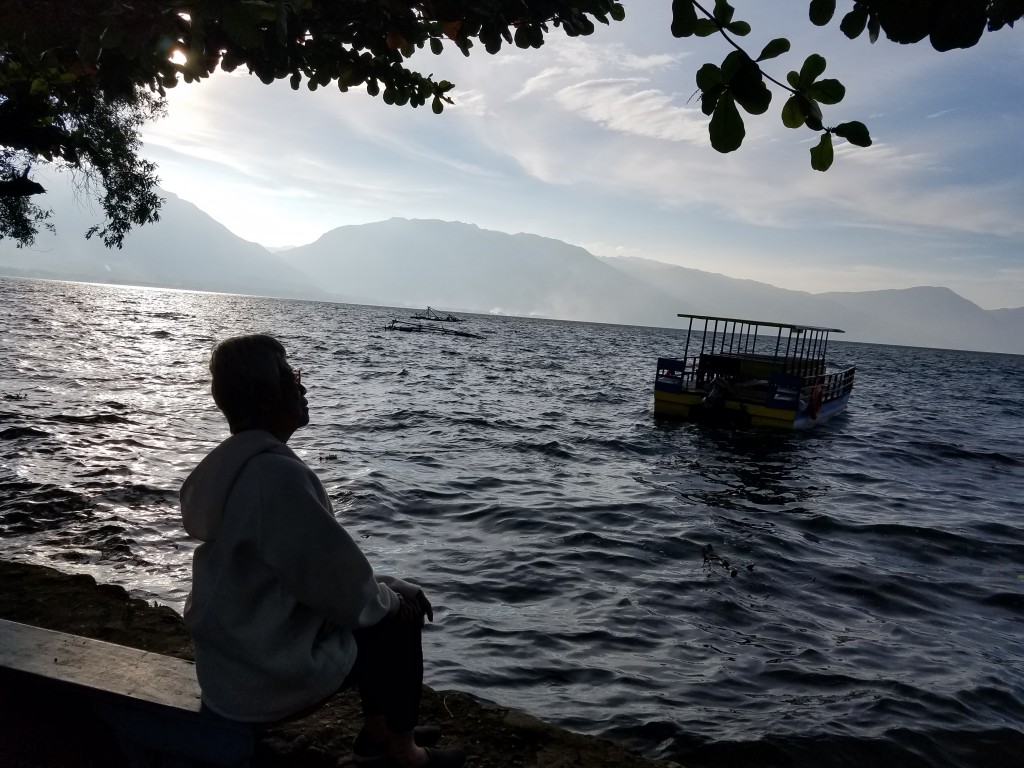
Lastly, we visited Istana Pagaruyung, the Minangkabau palace in Pagaruyung, Batusangkar.
It was dusk when we arrived at the gates of this 17th century impressive piece of architecture that has survived several fires. We admired the ornate interior carvings, the displayed textiles and ornaments and imagined their functionality in life then. Evening quickly wrapped the area in a mystical glow and sent us home filled with wonder and curiosity about the past.
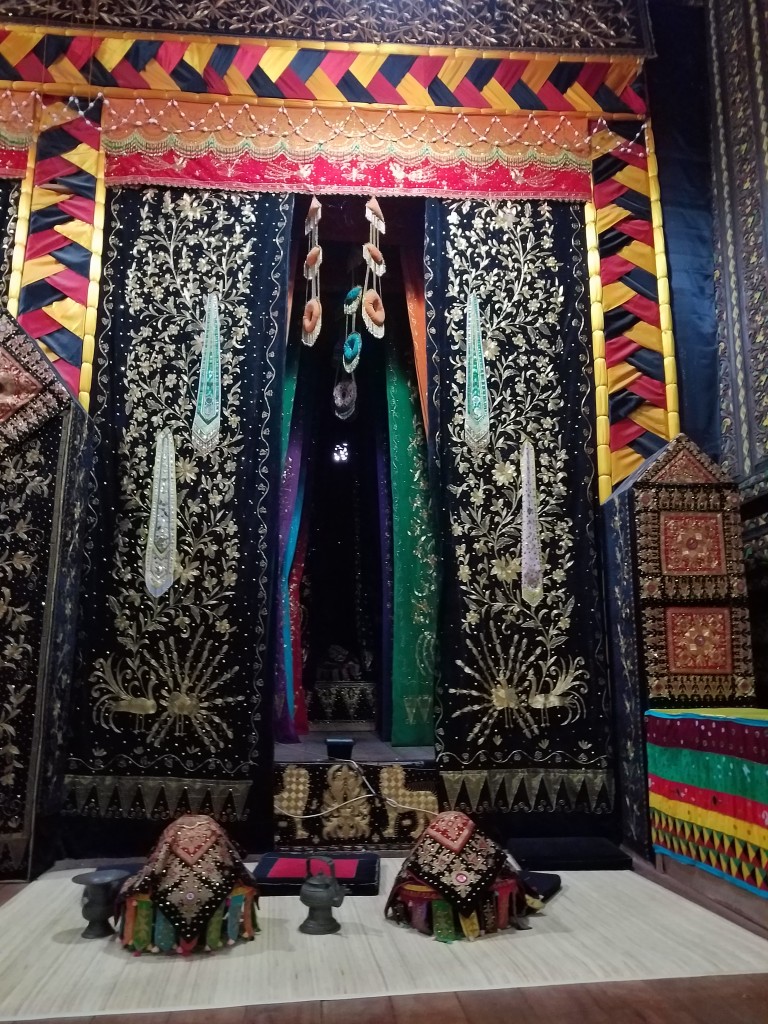
Saturday, December 17, 2018.
We spent the morning at the beautiful Air Manis beach, also known as Malin Kundang beach in Padang. Unfortunately, the rock formation that reminds us of the Malin Kundang legend is surrounded by food stalls and therefore very hard to photograph. The rock formation shows a man laying prostrate asking forgiveness from his mother for insulting her. According to the story the man refused to see his mother after returning to his village as a rich man.
Later that afternoon, we met with Padang Literati.
Meeting Padang Literati.
Zubaidah Djohar arranged a small get together at the Kubik Kafe with Padang literati and young aspiring writers they mentor.
Muhammad Ibrahim Ilyas is a published, award-winning playwright and the recipient of the Indonesian Literary Award 2017, Board of Language, Drama Category.
Dr. Hermawan, M. Hum., lecturer of Indonesian Language and Literature at The School of Teacher Training and Education and Chair of the West Sumatra Chapter Association of Indonesian Literary Scholars, is also a known Padang literary critic.
The informal, intimate setting was conducive for a lively exchange at a personal level on several topics, such as publication standards, the use of language on the page, and a writer’s expectations of work and goals. The afternoon was an enriching experience, and we hope our contact with this group will last long into the future.
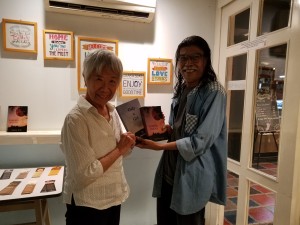
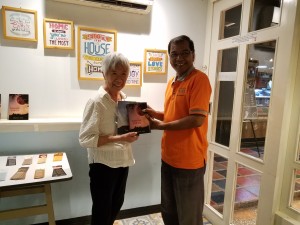
Yogyakarta, November 19, 2018
Guest Lecture for the Creative Writing Class at the Dept. of Indonesian Literature.
Universitas Sanata Dharma
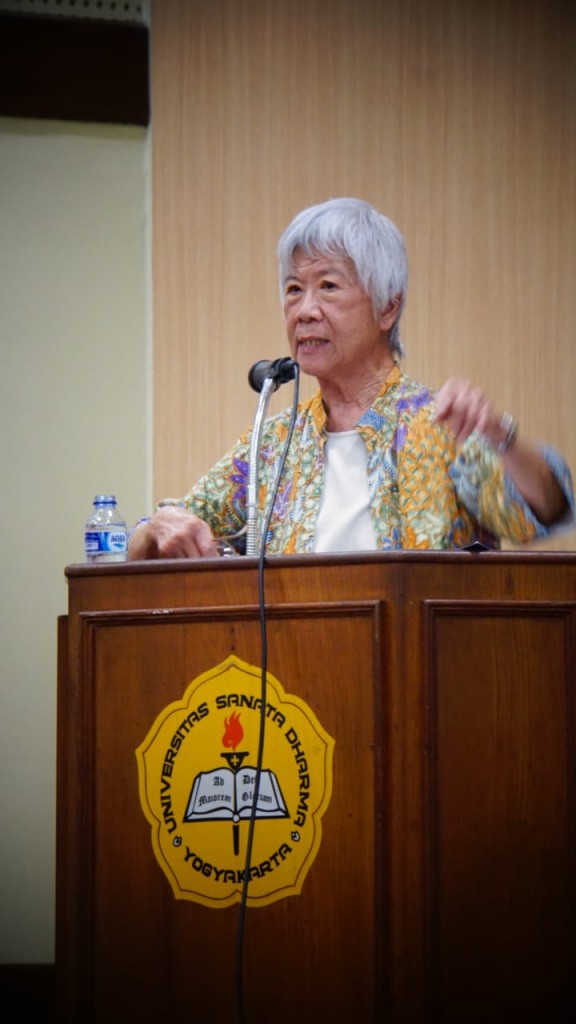
We thank Ibu Peni and Pak Yapi for giving Ibu Lian the opportunity to work with their students as a guest lecturer on the process of writing with the goal to publish. Aside from addressing the main elements of fiction, Ibu Lian also stressed the importance of using proper Indonesian rather than words corrupted by the English language.
A lively dialogue between her and the students ensued after the lecture.
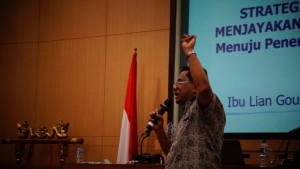
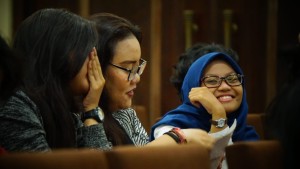
Purworejo, November 21, 2018
Workshop on Utilizing the Elements of Fiction to write Engaging Reports.
Hosted by Universitas Muhammadiyah Purworejo – UKM Jurnalistik Sinar Surya
We thank Pak Junaedi Setiyono for the introduction to Pak Andrian who teaches journalism at the Universitas Muhammadiyah in Purworejo and invited Ibu Lian to do the above mentioned workshop with his class.
Ibu Lian offered a copy of Dasamuka by Junaedi Setiyono (Penerbit Ombak & Dalang Publishing 2017) and a copy of Lolong Anjing di Bulan by Arafat Nur (Sanata Dharma University Press & Dalang Publishing 2018) as prizes for the best writing and the most engaged student.
Trasta Diah chose Lolong Anjing di Bulan for her winning of the best written workshop writing exercise. The following is her take on the workshop.
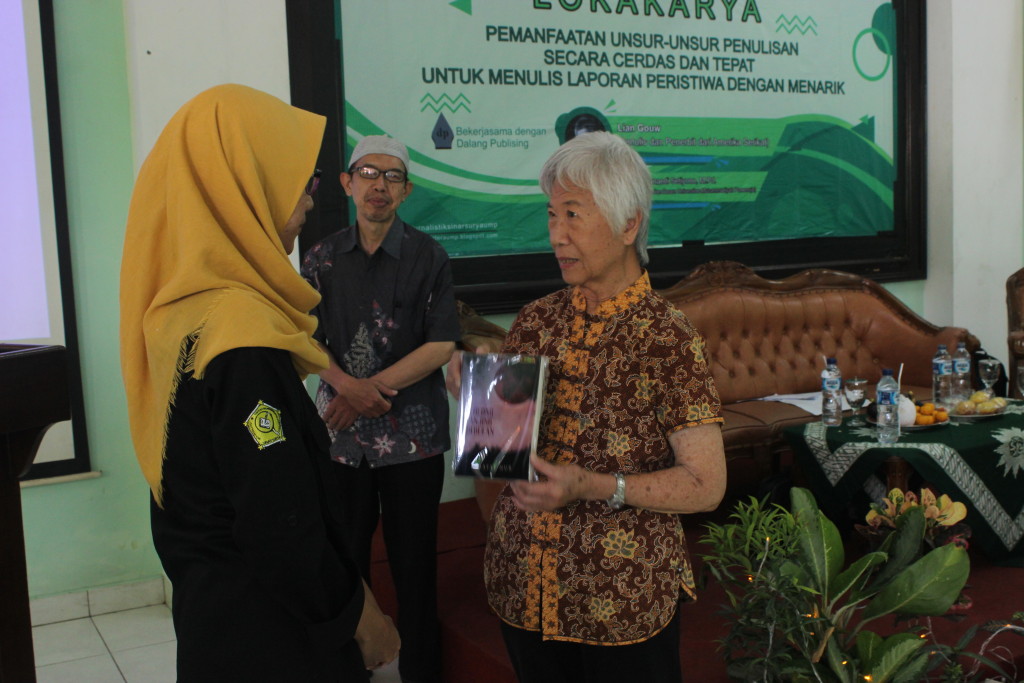
For most people, reading newspapers or magazines is boring. But, I do enjoy reading novels, especially Lolong Anjing di Bulan by Arafat Nur.
At the workshop organized by UKM Jurnalistik Sinar Surya Universitas Muhammadiyah Purworejo, on Wednesday, November 21st, 2018, my fellow students were given the opportunity to pretend to be journalists.
The material Ibu Lian presented was very engaging. She explained in detail how to write a news article accurately. It was also interesting that Ibu Lian who lives abroad encouraged us to use proper Indonesian for all our communication and writing. Thank you Ibu Lian and Pak Jun for inspiring us.
Diki Bayu Aji was rewarded for his enthused participation with a copy of Dasamuka. The following is his take on the workshop.
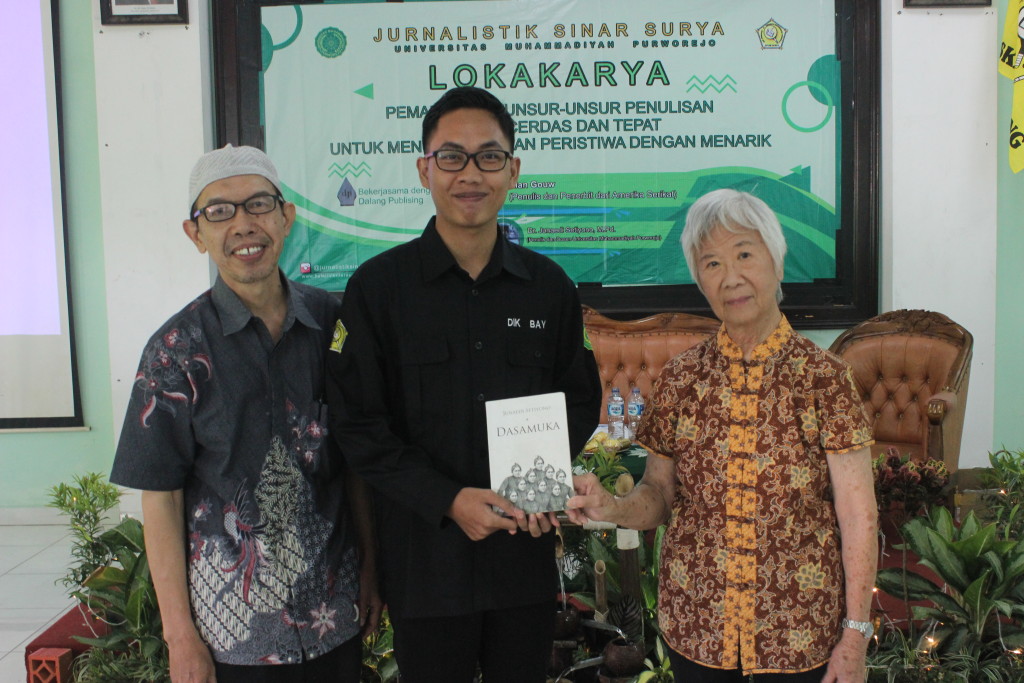
I’m proud to have attended a workshop on the implementation of the elements of writing in journalism. I often find reading, especially news, boring. The workshop taught me how to avoid boring my readers.
Ibu Lian Gouw explained that in order to write news accurately, we need to engage the three senses we are born with: to see, hear and feel. I’m also inspired by Ibu Lian, who despite having lived outside of Indonesia for so long, still emphasizes to love the Indonesian language with the same spirit we vowed in the Sumpah Pemuda, the Youth Pledge. The workshop inspired me to continue to write and my win of the novel Dasamuka by Pak Jun, strengthens this intent. Thank you Ibu Lian Gouw and Bapak Junaedi Setiyono.
After the event, the rector of the Universitas Muhammadiyah Purworejo, Drs. H. Supriyono, M.Pd, invited Ibu Lian and Pak Jun to his office.
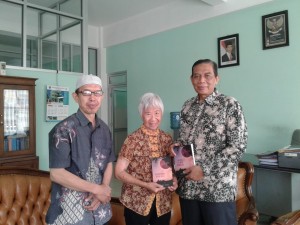
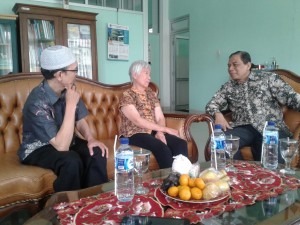
Jakarta, November 23, 2018
Open Discussion – How can Indonesian Writers reach American Readers?
Hosted by: Dapur Sastra Jakarta
Pusat Dokumentasi Sastra HB Jassin
Taman Ismail Marzuki
Riri Satria, an old high school friend of Tuti and the administrator of Dapur Sastra Jakarta, a community of poets and writers, invited us to their monthly meeting to introduce Dalang, Lolong Anjing di Bulan /Blood moon over Aceh and have an open discussion with attendees regarding the novel, writing related issues, publishing in general, and translation requirements.
The meeting was well attended. Riri moderated the animated discussion which gave us a chance to share our mission and members a chance to talk about their work. This, in turn, allowed us to meet several talented writers.
Pak Diky Lukman, Kepala Satuan Pelaksana Pusat Dokumentasi Sastra H.B Jassin, Head, Operational Unit H.B. Jassin’s Center of Literary Documentation, showed documents with the original handwriting of the poet Chairil Anwar (1940s.) It was not only a pleasure but also a great privilege to see the handwriting of the great Indonesian poet.
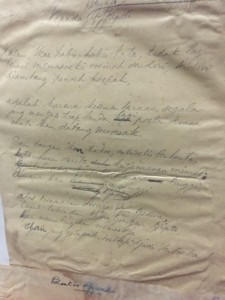
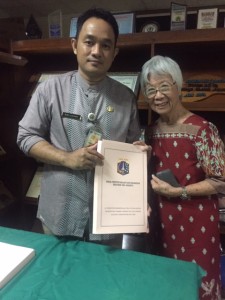
***
This was our last event on our 2018 visit home. We came back to the USA tired, but enriched, from our 2018 month-long travel back home on a packed, tight schedule and look forward to going home later this year.
We wish you all a healthy, happy and fulfilling 2019.

